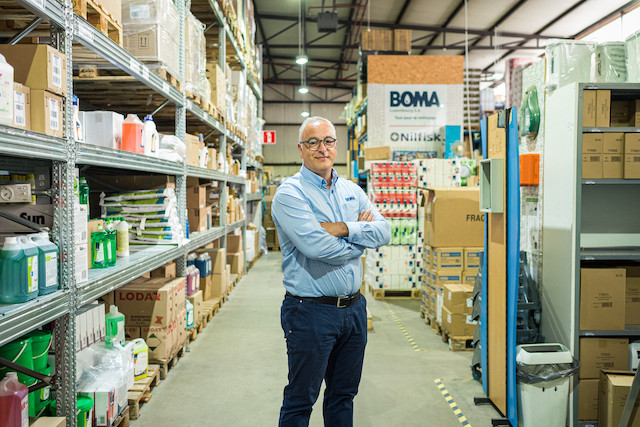It’s a busy time for cleaning supplies firm Boma. Founded in Luxembourg as an offshoot of a Belgian firm 20 years ago, the phone at the company’s warehouse in Howald is rarely quiet. “We’ve expanded our client base,” says Caetano. “We’ve had a lot more specific requests from people looking for information on health and safety.”
While before the crisis, orders came largely from intermediaries like contract cleaning firms, today, Caetano says he is being contacting directly by clients, many from the public sector.
“I don’t sell miracle products,” the manager says, explaining that the traditional methods of regular and focused cleaning on points of contact are sufficient to manage the risk. But, the pandemic has prompted Boma to expand some lines, such as foggers, misters and nebuliser machines. These devices disinfect larger surfaces. Caetano favours more focused devices which “directly project disinfectant on the surface being treated and not an entire room.” Boma has sold several such devices for use on trains, buses and trams in Luxembourg.
Procurement problems
Demand for masks and hand sanitising products has meanwhile rocketed. Given the acute global demand for these products, procurement has not been simple. “There was an enormous lack of FFP2 [surgical] masks and the price tripled from one day to the next, for no apparent reason, apart from the economic reason.”
Boma sources its masks through a provider in Asia. But despite using its regular “trusted” channels, Boma still received a shipment which, when tested by a Belgian standards firm, proved not to meet the Benelux norms. “We burned them. It was an astronomical quantity that had to be thrown out. That was in May. We had the same thing with hand gel.”
As a firm, Boma prides itself on selling environmentally friendly cleaning alternatives and also sells washable cotton masks, which Caetano favours. “Disposable masks take 400 years to degrade,” he points out, adding: “For some reason customers prefer disposable masks, which may seem less expensive but in the end cost more for the planet.”
Environmental impact
The environmental impact of Luxembourg society’s response to the pandemic is a concern. Whether it’s the mass of disposable masks being thrown away, the use of bleach, which disrupts the organic processes in water treatment plants or excessive use of disinfectant on human health. “Nebulising disinfectant isn’t very smart because it destroys the good and the bad bacteria […] We can destroy the sars cov-2 virus with an alkali-based product because it has a gelatinous membrane that’s relatively weak.”
Caetano stresses, the efficiency of any product depends on its application and the big pandemic lesson for his sector is the need to train and equip cleaning agents with skills and know-how. That is why he and a number of other sector players are working on a project to create an industrial cleaning school. “It’s not just that I give you a product that it’s good to use. You need a certain amount of knowledge,” he says. Ultimately, the school should provide a career progression and further increase the standing of cleaning staff, whose role has never been so critical.
